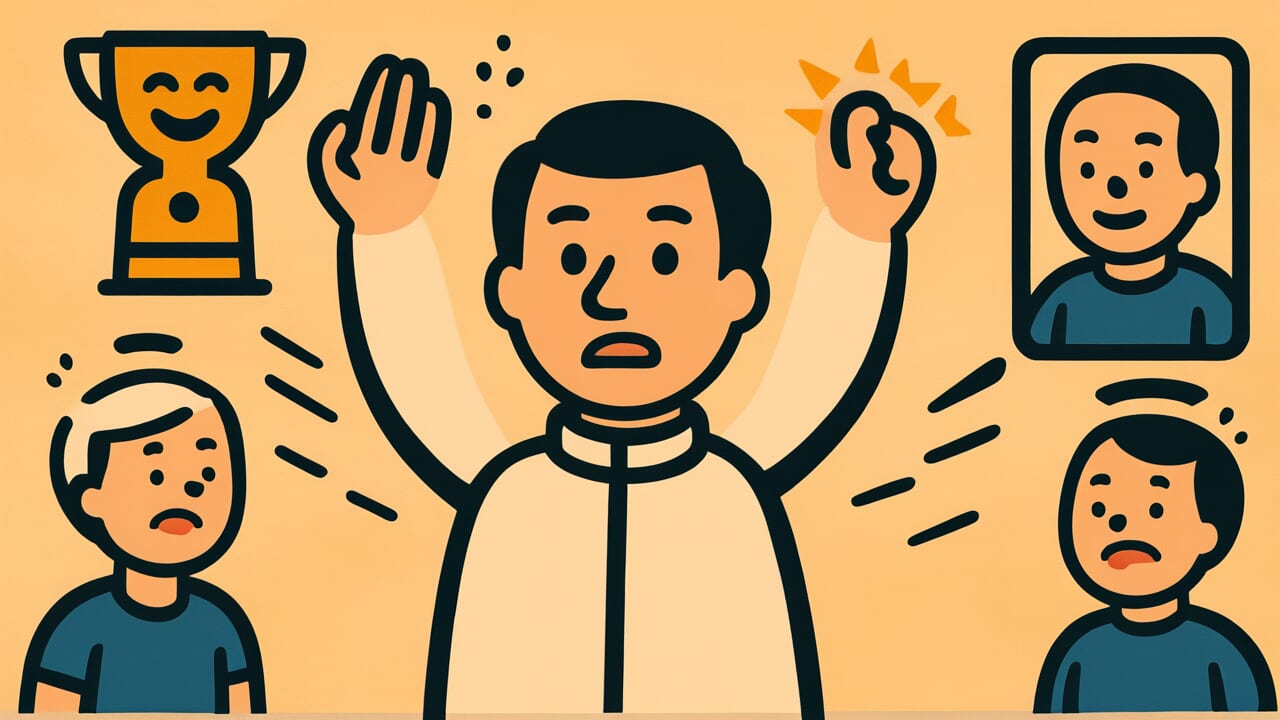How to Read “First praised, second hated, third loved, fourth catch a cold”
ichi ni homerarete ni ni nikumarete san ni horerare shi ni kaze hiku
Meaning of “First praised, second hated, third loved, fourth catch a cold”
This proverb teaches that life experiences follow a certain order. Through each stage, people grow and mature.
First, being praised builds confidence. Second, being hated teaches you about complicated relationships. Third, being loved shows you both the joy and responsibility of affection.
Fourth, catching a cold reminds you of physical weakness and the importance of health.
This expression teaches us to accept life’s ups and downs calmly. Good things don’t last forever. After being praised, you might be hated.
But that’s also part of life. It’s an unavoidable experience. The proverb contains a philosophical view that accepts this reality.
People use this saying when someone is struggling with life’s waves. It tells them this is a natural flow. It’s also used when older generations share life wisdom with young people.
Even today, people understand it as words that show the mindset to accept unexpected turns in life.
Origin and Etymology
The exact source of this proverb is unclear. However, it’s believed to be life wisdom passed down among common people since the Edo period.
This phrase has a rhythmic structure like a counting song. It follows the traditional Japanese format of expressing life stages in order.
The pattern “first, second, third, fourth” has been used in Japanese for a long time. It shows priority or time sequence.
Using this format made life experiences easy to remember. It also made the saying easy to spread by word of mouth.
The four chosen elements are interesting. It starts with being praised, then moves to being hated, being loved, and catching a cold.
This progression combines ups and downs in relationships with physical trials. Adding “catching a cold,” an everyday illness, at the end is especially characteristic.
It makes the proverb feel relatable to common people. Even though it’s noble life wisdom, it stays grounded in everyday reality.
The background of this saying reflects Japanese views on life. Life is a series of unpredictable events. Good and bad things come in turns.
It expresses the attitude of living while accepting fate. You could call it common people’s wisdom expressed with humor.
Usage Examples
- When I was young, it was “first praised, second hated, third loved, fourth catch a cold” – so many things happened
- They say life is “first praised, second hated, third loved, fourth catch a cold,” and it’s really true
Universal Wisdom
The universal wisdom in this proverb is simple. Life is a series of unpredictable events. All of them are important experiences that shape who we are.
The joy from being praised matters. The pain from being hated matters. The weight of love from being loved matters. The fragility felt from catching a cold matters.
Not a single experience is wasted.
Humans naturally feel anxious about things they can’t control. But our ancestors saw through this. They understood that uncertainty itself is the essence of life.
No life is smooth sailing. Good and bad things come alternately. By expressing this in a counting song rhythm, they teach us mental flexibility.
They show us how to accept life’s waves with a light heart.
What’s especially noteworthy is this: all four experiences arise from interactions with others or the environment. Being praised, hated, and loved all happen in human relationships.
Even the final cold is a dialogue with your body, “another other.” People are never isolated beings. They always live within relationships with something.
This truth is embedded in the proverb.
That’s why these words continue to resonate across time. Don’t fear life’s uncertainty. Accept it as a natural flow.
This flexible mindset has been needed throughout history. It’s still needed today.
When AI Hears This
Looking at this proverb, you can see that human psychological systems have a force that tries to keep total emotions constant.
In physics, the law of energy conservation says total energy doesn’t change, only its form. The human mind has a similar mechanism.
When you’re praised or loved, psychological energy shoots up. Then the brain judges, “This is dangerous if it continues.” Why? Because staying excited too long exhausts mind and body.
For example, research shows lottery winners’ happiness returns to baseline after one year. Psychology calls this “hedonic adaptation.”
In other words, humans dislike extreme states. They try to return to neutral.
What’s interesting is that this balance adjustment happens through both social negatives (being hated) and physical negatives (catching a cold).
Medical science confirms that when the mind is elevated, immune system balance becomes unstable. Newlyweds getting sick right after their wedding is a typical example.
This proverb teaches us that life’s ups and downs aren’t random. They’re the system’s automatic adjustment function.
When good things continue, the next negative isn’t “punishment.” It’s “a necessity to maintain equilibrium.”
Lessons for Today
This proverb teaches modern people the courage to accept life’s diversity without fear. The joy of getting “likes” on social media and being praised matters.
The pain of hate comments matters. The confusion when someone shows affection matters. The fragility of getting sick matters. All of these enrich your life.
Modern society has a strong tendency to avoid negative experiences. But this proverb teaches us differently. Being hated and catching a cold are natural parts of life.
What matters is what you learn from each experience. Stay humble when praised. Reflect on yourself when hated. Care for others when loved. Appreciate health when you catch a cold.
Every event in your life has meaning. Good and bad, everything is nutrition for your growth.
So don’t be afraid. Enjoy the adventure called life. Savor each experience carefully. Keep walking forward with your head held high.



Comments